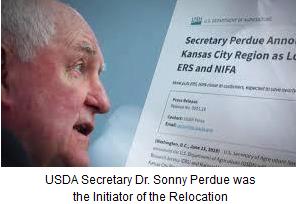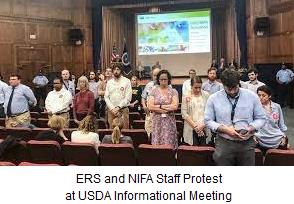 Following the decision by the previous Administration to relocate the USDA Economic Research Service (ERS) and the National Institute of Food and Agriculture (NIFA) from Washington, D.C. to Kansas City, MO. Democrats on the House Science Committee requested the Government Accounting Office (GAO) to analyze the claimed cost-benefit justification for the action.
Following the decision by the previous Administration to relocate the USDA Economic Research Service (ERS) and the National Institute of Food and Agriculture (NIFA) from Washington, D.C. to Kansas City, MO. Democrats on the House Science Committee requested the Government Accounting Office (GAO) to analyze the claimed cost-benefit justification for the action.
At the time of the announcement by then Secretary of Agriculture’s Dr. Sonny Perdue, EGG-NEWS questioned the claimed financial benefit and suggested that the action was taken to “sanitize” both agencies that were generating data and reports that conflicted with Administration policy. One of the claimed benefits for the move was that economists and scientists at both agencies would be closer to their constituencies. This was refuted by the fact that in the age of E-mail and the internet, data was as readily available in Washington, D.C. as it was in Kansas City. Economists are not extension agents and do not have to walk through fields of corn and soybeans or meet with farmers on a day-to-day basis to perform their analyses. To the  contrary, economists at ERS and the scientists at NIFA had close connections with the producer associations representing agricultural and commodity groups in D.C., were colaborating with academic institutions in a tri-state area and were interacting with think tanks and other government departments leading to synergy and creativity.
contrary, economists at ERS and the scientists at NIFA had close connections with the producer associations representing agricultural and commodity groups in D.C., were colaborating with academic institutions in a tri-state area and were interacting with think tanks and other government departments leading to synergy and creativity.
The GAO report refuted the cost-savings claimed to be $300 million over a number of years. The GAO faulted the USDA for ignoring critical costs relating to the loss of highly-qualified staff. This may in fact have been the initial reason for the proposed relocation since senior personnel were studying and publishing on topics including the economic impact of climate change on agricultural productivity and food insecurity.
The GAO found that the selection process by which 139 expressions of interest to receive the two agencies were whittled down to the final four possible locations was flawed since elimination disregarded stakeholder proximity and the ability to recruit and retain qualified staff. Obviously, the proposal to relocate the agencies should have raised concern over disruption of ongoing projects and calculating the potential loss associated with the predictable consequences of the relocation. The GAO report found, “High-quality analysis was absent including transparency around key methodological decisions and sensitivity analysis to assess the reasonableness of critical assumptions.” Those responsible for developing the benefit-cost analysis deviated from guidance provided by the Office of Management and Budget based on the Foundation for Evidence-based Policy Making Act of 2018.
 Despite objections and protests by staff of the two agencies, cooperating academics, past directors of NIFA and ERS, the relocation became a reality resulting in a high number of resignations, especially among senior scientists and economists who did not wish to move from the D.C. area. The predictable counterpart was a failure to recruit and appoint suitable replacements after the move to Kansas City, MO.
Despite objections and protests by staff of the two agencies, cooperating academics, past directors of NIFA and ERS, the relocation became a reality resulting in a high number of resignations, especially among senior scientists and economists who did not wish to move from the D.C. area. The predictable counterpart was a failure to recruit and appoint suitable replacements after the move to Kansas City, MO.
The GAO did not make any recommendation relating to the relocation but pointed to the need to use facts and substantiated evidence in developing an analysis on which to base policy decisions.
The questions that remain concern whether either or both of the agencies was weakened in their potential to serve stakeholders and whether savings will in fact accrue to the USDA and ultimately to taxpayers. It is hoped that in future, irrespective of the party controlling the Executive and or Legislative branches of government, decision-making will be transparent, and methodical. An evidence-based approach should be applied to analyze policy decisions and actions that affect the lives of government workers and their ability to serve their constituencies.
At this time, the relocation is a fait accompli and probably will never be reversed. Let us hope that productivity at both Agencies has been restored and that there will not be a repetition of a destructive action to support a policy agenda.